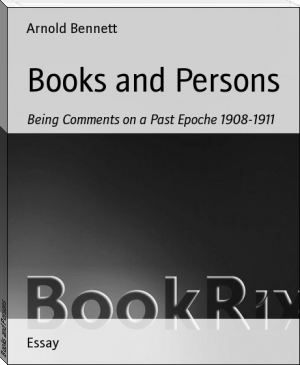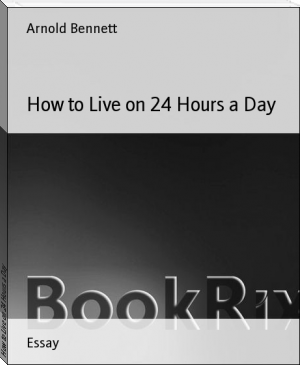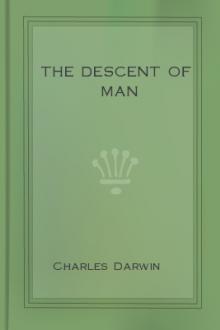Books and Persons - Arnold Bennett (phonics readers .TXT) 📗

- Author: Arnold Bennett
Book online «Books and Persons - Arnold Bennett (phonics readers .TXT) 📗». Author Arnold Bennett
specializing in elephants or radium; but a real bookshop does not exist. In a town of forty thousand inhabitants there will be a couple of stationers, whose chief pride is that they are "steam printers" or lithographers. Enter their shops, and you will see a few books. Tennyson in gilt. Volumes of the Temple Classics or Everyman. Hymn-books, Bibles. The latest cheap Shakespeare. Of new books no example except the brothers Hocking. The stationer will tell you that there is no demand for books; but that he can procure anything you specially want by return of post. He will also tell you that on the whole he makes no profit out of books; what trifle he captures on his meagre sales he loses on books unsold. He may inform you that his rival has entirely ceased to stock books of any sort, and that he alone stands for letters in the midst of forty thousand people. In a town of sixty thousand there will be a largeish stationer's with a small separate book department. Contents similar to the other shop, with a fair selection of cheap reprints, and half a dozen of the most notorious new novels, such as novels by Marie Corelli, Max Pemberton, Mrs. Humphry Ward. That is all. Both the shops described will have two or three regular book-buying clients, not more than ten in a total of a hundred thousand. These ten are book-lovers. They follow the book lists. They buy to the limit of their purses. And in the cult of literature they keep themselves quite apart from the society of the town, despising it. The town is simply aware that they are "great readers."
* * * * *
Another agency for the radiation of light in the average town first mentioned is the Municipal Free Library. The yearly sum spent on it is entirely inadequate to keep it up to date. A fraction of its activity is beneficial, as much to the artisan as to members of the crust. But the chief result of the penny-in-the-pound rate is to supply women old and young with outmoded, viciously respectable, viciously sentimental fiction. A few new novels get into the Library every year. They must, however, be "innocuous," that is to say, devoid of original ideas. This, of course, is inevitable in an institution presided over by a committee which has infinitely less personal interest in books than in politics or the price of coal. No Municipal Library can hope to be nearer than twenty-five years to date. Go into the average good home of the crust, in the quietude of "after-tea," and you will see a youthful miss sitting over something by Charlotte M. Yonge or Charles Kingsley. And that something is repulsively foul, greasy, sticky, black. Remember that it reaches from thirty to a hundred such good homes every year. Can you wonder that it should carry deposits of jam, egg, butter, coffee, and personal dirt? You cannot. But you are entitled to wonder why the Municipal Sanitary Inspector does not inspect it and order it to be destroyed.... That youthful miss in torpidity over that palimpsest of filth is what the Free Library has to show as the justification of its existence. I know what I am talking about.
* * * * *
A third agency is the book-pedlar. There are firms of publishers who never advertise in any literary weekly or any daily, who never publish anything new, and who may possibly be unknown to Simpkins themselves. They issue badly printed, badly bound, showy editions of the eternal Scott and the eternal Dickens, in many glittering volumes with scores of bleared illustrations, and they will sell them up and down the provinces by means of respectably dressed "commission agents," at prices much in excess of their value, to an ingenuous, ignorant public that has never heard of Dent and Routledge. The books are found in houses where the sole function of literature is to flatter the eye. The ability of these subterranean firms to dispose of deplorable editions to persons who do not want them is in itself a sharp criticism of the commercial organization of the more respectable trade.
* * * * *
Let it not be supposed that my group is utterly cut off from the newest developments in imaginative prose literature. No! What the bookseller, the book-pedlar, and the Free Library have failed to do, has been accomplished by Mr. Jesse Boot, incidentally benefactor of the British provinces and the brain of a large firm of chemists and druggists with branches in scores, hundreds, of towns. He has several branches in my group. Each branch has a circulating library, patronized by the class which has only heard of Mudie, and has not heard of the Grosvenor. Mr. Jesse Boot has had the singular and beautiful idea of advertising his wares by lending books to customers and non-customers at a loss of ten thousand a year. His system is simplicity and it is cheapness. He is generous. If you desire a book which he has not got in stock he will buy it and lend it to you for twopence. Thus in the towns of my group the effulgent centre of culture is the chemist's shop. The sole point of contact with living literature is the chemist's shop. A wonderful world, this England! Two things have principally struck me about Mr. Jesse Boot's [Now Sir Jesse Boot] clients. One is that they are usually women, and the other is that they hire their books at haphazard, nearly in the dark, with no previous knowledge of what is good and what is bad.
* * * * *
It is to be added that the tremendous supply of sevenpenny bound volumes of modern fiction, and of shilling bound volumes of modern belles-lettres (issued by Nelsons and others), is producing a demand in my group, is, in fact, making book-buyers where previously there were no book-buyers. These tomes now rival the works of the brothers Hocking in the stationer's shop. Their standard is decidedly above the average, owing largely to the fact that the guide-in-chief of Messrs. Nelsons happens to be a genuine man of letters. I am told that Messrs. Nelsons alone sell twenty thousand volumes a week. Yet even they have but scratched the crust. The crust is still only the raw material of a new book public.
* * * * *
If it is cultivated and manufactured with skill it will surpass immeasurably in quantity, and quite appreciably in quality, the actual book public. One may say that the inception of the process has been passably good. One is inclined to prophesy that within a moderately short period--say a dozen years--the centre of gravity of the book market will be rudely shifted. But the event is not yet.
H.G. WELLS
[_4 Mar. '09_]
Wells! I have heard that significant monosyllable pronounced in various European countries, and with various bizarre accents. And always there was admiration, passionate or astonished, in the tone. But the occasion of its utterance which remains historic in my mind was in England. I was, indeed, in Frank Richardson's Bayswater. "Wells?" exclaimed a smart, positive little woman--one of those creatures that have settled every question once and for all beyond reopening, "Wells? No! I draw the line at Wells. He stirs up the dregs. I don't mind the froth, but dregs I--will--not have!" And silence reigned as we stared at the reputation of Wells lying dead on the carpet. When, with the thrill of emotion that a great work communicates, I finished reading "Tono-Bungay," I thought of the smart little woman in the Bayswater drawing-room. I was filled with a holy joy because Wells had stirred up the dregs again, and more violently than ever. I rapturously reflected, "How angry this will make them!" "Them" being the whole innumerable tribe of persons, inane or chumpish (this adjective I give to the world), who don't mind froth but won't have dregs. Human nature--you get it pretty complete in "Tono-Bungay," the entire tableau! If you don't like the spectacle of man whole, if you are afraid of humanity, if humanity isn't good enough for you, then you had better look out for squalls in the perusal of "Tono-Bungay." For me, human nature is good enough. I love to bathe deep in it. And of "Tono-Bungay" I will say, with solemn heartiness: "By God! This is a book!"
* * * * *
You will have heard that it is the history of a patent medicine--the nostrum of the title. But the rise and fall of Tono-Bungay and its inventor make only a small part of the book. It is rather the history of the collision of the soul of George Ponderevo (narrator, and nephew of the medicine-man) with his epoch. It is the arraignment of a whole epoch at the bar of the conscience of a man who is intellectually honest and powerfully intellectual. George Ponderevo transgresses most of the current codes, but he also shatters them. The entire system of sanctions tumbles down with a clatter like the fall of a corrugated iron church. I do not know what is left standing, unless it be George Ponderevo. I would not call him a lovable, but he is an admirable, man. He is too ruthless, rude, and bitter to be anything but solitary. His harshness is his fault, his one real fault; and his harshness also marks the point where his attitude towards his environment becomes unscientific. The savagery of his description of the family of Frapp, the little Nonconformist baker, and of the tea-drinkers in the housekeeper's room at Bladesover, somewhat impairs even the astounding force of this, George's first and only novel--not because he exaggerates the offensiveness of the phenomena, but because he unscientifically fails to perceive that these people are just as deserving of compassion as he is himself. He seems to think that, in their deafness to the call of the noble in life, these people are guilty of a crime; whereas they are only guilty of a misfortune. The one other slip that George Ponderevo has made is a slight yielding to the temptation of caricature, out of place in a realistic book. Thus he names a half-penny paper, "The Daily Decorator," and a journalistic peer, "Lord Boom." Yet the few lines in which he hints at the tactics and the psychology of his Lord Boom are masterly. So much for the narrator, whose "I" writes the book. I assume that Wells purposely left these matters uncorrected, as being essential to the completeness of George's self-revelation.
*
* * * * *
Another agency for the radiation of light in the average town first mentioned is the Municipal Free Library. The yearly sum spent on it is entirely inadequate to keep it up to date. A fraction of its activity is beneficial, as much to the artisan as to members of the crust. But the chief result of the penny-in-the-pound rate is to supply women old and young with outmoded, viciously respectable, viciously sentimental fiction. A few new novels get into the Library every year. They must, however, be "innocuous," that is to say, devoid of original ideas. This, of course, is inevitable in an institution presided over by a committee which has infinitely less personal interest in books than in politics or the price of coal. No Municipal Library can hope to be nearer than twenty-five years to date. Go into the average good home of the crust, in the quietude of "after-tea," and you will see a youthful miss sitting over something by Charlotte M. Yonge or Charles Kingsley. And that something is repulsively foul, greasy, sticky, black. Remember that it reaches from thirty to a hundred such good homes every year. Can you wonder that it should carry deposits of jam, egg, butter, coffee, and personal dirt? You cannot. But you are entitled to wonder why the Municipal Sanitary Inspector does not inspect it and order it to be destroyed.... That youthful miss in torpidity over that palimpsest of filth is what the Free Library has to show as the justification of its existence. I know what I am talking about.
* * * * *
A third agency is the book-pedlar. There are firms of publishers who never advertise in any literary weekly or any daily, who never publish anything new, and who may possibly be unknown to Simpkins themselves. They issue badly printed, badly bound, showy editions of the eternal Scott and the eternal Dickens, in many glittering volumes with scores of bleared illustrations, and they will sell them up and down the provinces by means of respectably dressed "commission agents," at prices much in excess of their value, to an ingenuous, ignorant public that has never heard of Dent and Routledge. The books are found in houses where the sole function of literature is to flatter the eye. The ability of these subterranean firms to dispose of deplorable editions to persons who do not want them is in itself a sharp criticism of the commercial organization of the more respectable trade.
* * * * *
Let it not be supposed that my group is utterly cut off from the newest developments in imaginative prose literature. No! What the bookseller, the book-pedlar, and the Free Library have failed to do, has been accomplished by Mr. Jesse Boot, incidentally benefactor of the British provinces and the brain of a large firm of chemists and druggists with branches in scores, hundreds, of towns. He has several branches in my group. Each branch has a circulating library, patronized by the class which has only heard of Mudie, and has not heard of the Grosvenor. Mr. Jesse Boot has had the singular and beautiful idea of advertising his wares by lending books to customers and non-customers at a loss of ten thousand a year. His system is simplicity and it is cheapness. He is generous. If you desire a book which he has not got in stock he will buy it and lend it to you for twopence. Thus in the towns of my group the effulgent centre of culture is the chemist's shop. The sole point of contact with living literature is the chemist's shop. A wonderful world, this England! Two things have principally struck me about Mr. Jesse Boot's [Now Sir Jesse Boot] clients. One is that they are usually women, and the other is that they hire their books at haphazard, nearly in the dark, with no previous knowledge of what is good and what is bad.
* * * * *
It is to be added that the tremendous supply of sevenpenny bound volumes of modern fiction, and of shilling bound volumes of modern belles-lettres (issued by Nelsons and others), is producing a demand in my group, is, in fact, making book-buyers where previously there were no book-buyers. These tomes now rival the works of the brothers Hocking in the stationer's shop. Their standard is decidedly above the average, owing largely to the fact that the guide-in-chief of Messrs. Nelsons happens to be a genuine man of letters. I am told that Messrs. Nelsons alone sell twenty thousand volumes a week. Yet even they have but scratched the crust. The crust is still only the raw material of a new book public.
* * * * *
If it is cultivated and manufactured with skill it will surpass immeasurably in quantity, and quite appreciably in quality, the actual book public. One may say that the inception of the process has been passably good. One is inclined to prophesy that within a moderately short period--say a dozen years--the centre of gravity of the book market will be rudely shifted. But the event is not yet.
H.G. WELLS
[_4 Mar. '09_]
Wells! I have heard that significant monosyllable pronounced in various European countries, and with various bizarre accents. And always there was admiration, passionate or astonished, in the tone. But the occasion of its utterance which remains historic in my mind was in England. I was, indeed, in Frank Richardson's Bayswater. "Wells?" exclaimed a smart, positive little woman--one of those creatures that have settled every question once and for all beyond reopening, "Wells? No! I draw the line at Wells. He stirs up the dregs. I don't mind the froth, but dregs I--will--not have!" And silence reigned as we stared at the reputation of Wells lying dead on the carpet. When, with the thrill of emotion that a great work communicates, I finished reading "Tono-Bungay," I thought of the smart little woman in the Bayswater drawing-room. I was filled with a holy joy because Wells had stirred up the dregs again, and more violently than ever. I rapturously reflected, "How angry this will make them!" "Them" being the whole innumerable tribe of persons, inane or chumpish (this adjective I give to the world), who don't mind froth but won't have dregs. Human nature--you get it pretty complete in "Tono-Bungay," the entire tableau! If you don't like the spectacle of man whole, if you are afraid of humanity, if humanity isn't good enough for you, then you had better look out for squalls in the perusal of "Tono-Bungay." For me, human nature is good enough. I love to bathe deep in it. And of "Tono-Bungay" I will say, with solemn heartiness: "By God! This is a book!"
* * * * *
You will have heard that it is the history of a patent medicine--the nostrum of the title. But the rise and fall of Tono-Bungay and its inventor make only a small part of the book. It is rather the history of the collision of the soul of George Ponderevo (narrator, and nephew of the medicine-man) with his epoch. It is the arraignment of a whole epoch at the bar of the conscience of a man who is intellectually honest and powerfully intellectual. George Ponderevo transgresses most of the current codes, but he also shatters them. The entire system of sanctions tumbles down with a clatter like the fall of a corrugated iron church. I do not know what is left standing, unless it be George Ponderevo. I would not call him a lovable, but he is an admirable, man. He is too ruthless, rude, and bitter to be anything but solitary. His harshness is his fault, his one real fault; and his harshness also marks the point where his attitude towards his environment becomes unscientific. The savagery of his description of the family of Frapp, the little Nonconformist baker, and of the tea-drinkers in the housekeeper's room at Bladesover, somewhat impairs even the astounding force of this, George's first and only novel--not because he exaggerates the offensiveness of the phenomena, but because he unscientifically fails to perceive that these people are just as deserving of compassion as he is himself. He seems to think that, in their deafness to the call of the noble in life, these people are guilty of a crime; whereas they are only guilty of a misfortune. The one other slip that George Ponderevo has made is a slight yielding to the temptation of caricature, out of place in a realistic book. Thus he names a half-penny paper, "The Daily Decorator," and a journalistic peer, "Lord Boom." Yet the few lines in which he hints at the tactics and the psychology of his Lord Boom are masterly. So much for the narrator, whose "I" writes the book. I assume that Wells purposely left these matters uncorrected, as being essential to the completeness of George's self-revelation.
*
Free e-book «Books and Persons - Arnold Bennett (phonics readers .TXT) 📗» - read online now
Similar e-books:





Comments (0)